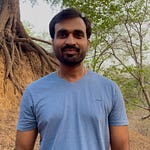The Pehli Peedi Fellowship presents the first in a series of stories highlighting the experiences of first-generation students across India.
Bhumeshwari Kawale is a 21-year-old postgraduate student currently pursuing her Master’s in Development at Azim Premji University, Bangalore. Hailing from the Bhandara district of Maharashtra, she is a first-generation learner from a farming family. Bhumeshwari’s academic journey reflects resilience and determination, overcoming patriarchal and structural barriers to access higher education.
“It was my mother who always stood by me and never forced me to sit at home unlike others. She was very eager that I have access to formal higher education. My late uncle, my mausaji, is another reason I am sitting in front of you and talking about my journey. He was a professor and he saw the potential in me.”
Read her full story below. Profile by Niharika Upadhyay.
Niharika: To begin with, can you tell me about yourself?
Bhumeshwari: My name is Bhumeshwari Kawale and I am 21 years old. I completed my graduation in Political Science from Fergusson College, Pune. Currently I am pursuing my Masters in Development from Azim Premji University, Bangalore. I was raised in Mahalgaon- a small village in Bhandara district, Maharashtra.
Niharika: Could you elaborate a little on your family background?
Bhumeshwari: I come from a family with strong rural ties. My father is a farmer and my mother is a homemaker. I have a brother who is three years older than me and he has completed his graduation. Now he is invested in advancing the farming techniques back home. My family dynamics are still centred around strong patriarchal power structures—the oldest male member still makes all the decisions. In this case, it is my grandfather who makes the decisions.
Niharika: Was education something people in your family and community talked about often?
Bhumeshwari: Absolutely not! Education was not the primary concern in my family or community. In fact, there was just one school and that would cater to students from three villages. You can imagine just how poor the teacher-student ratio was. I went to a government school and the medium of instruction was Marathi.
But, my experience at school was quite enjoyable. I was a shy child, something I have retained even now. But, I was a bright child and would often come first.
Niharika: Were there any hurdles that you faced in order to attend college?
Bhumeshwari: My grandfather was not very eager to send me for higher education. It was my mother who always stood by me and never forced me to sit at home unlike others. She was very eager that I have access to formal higher education. My late uncle, my mausaji, is the reason I am sitting in front of you and talking about my journey. He was a professor and he saw the potential in me. It was he who negotiated with my grandfather and convinced him to let me go to college. Since I had gotten good grades in my boards, it was easier to convince my grandfather.
Niharika: What was your journey to college like?
Bhumeshwari: The journey was eventful to say the least! I hadn’t even told my parents until I got selected. Going to Pune was beyond my family's expectations. It's 1000 km away from my home and I pursued Arts which is considered a lower profession in my community. That bothered me a lot. In fact the first time I went outside my village was difficult and challenging.
Since I have received a scholarship from the Azim Premji Foundation, funding is not an issue. For admission at APU I had to sit for an entrance test and an interview. I could not clear my first round of interview which had left me disheartened but I did manage to clear it in the second round.
Niharika: How has college life been treating you? Do you feel a sense of belonging here?
Bhumeshwari: College life is very happening but also extremely hectic! I am surrounded by people who belong to such diverse backgrounds with varied perspectives. It is a little daunting though because all my classmates are older than me with industry experience while I am a 21 year old fresher. Apart from that I have made quite a few friends. Although I do feel there is a certain communication gap, especially with students who come from elite backgrounds.
Niharika: Do you have any mentors—formal or informal—on campus or outside?
Bhumeshwari: In my university every student is assigned a mentor. My mentor is Prof. Avneesh. He teaches ethics and evidence. Prof Avneesh is one of the best mentors I could have asked for in all honesty. He listens to my issues and gives me the right guidance.
Niharika: What do you wish your professors, peers, or university leaders understood better about students like you?
Bhumeshwari: In my opinion, there should be centers in colleges and universities dedicated solely to helping first generation learners navigate their life in and beyond college. Furthermore, there are so many students who receive formal education in vernacular and thus communicating in English seems daunting, leading them to feel under confident even if they are perfectly smart and capable. As someone who has faced this communication gap, given that the medium of instruction at school and college was Marathi, I would want these centers to help students in bettering their English communicative skills as well.
Niharika: Do you feel being first-gen affects how others perceive you?
Bhumeshwari: Honestly, I don’t go around telling people that I am a first generation learner. That would be awkward and it would seem that I am trying to gain sympathy, which I, most certainly am not. Being a first generation learner is a part of me but it is not my entire personality. But to answer your question, the people who do know this little fact about me treat me quite normally, without any biases.
Niharika: What were your goals when you joined university? What are your goals now?
Bhumeshwari: Initially my goal was to secure a good placement and lead an independent life. However after going through different experiences and engaging with the community at the grassroots level, my mindset has undergone significant changes. My goal now is to give back to the community. I’ll give you an example- I had to go to Nashik to collect some preliminary data for a survey and there I witnessed young girls in purdah. Married young girls! My long term goal is therefore to open an NGO for poor girls from marginalized sections of the society. Helping others is my definition of success now and I am rather content with it.
Niharika: Do you feel your image has changed among your family, friends, or community after joining university?
Bhumeshwari: Certainly! I have become independent enough to afford my own finances, which is definitely an achievement worth celebrating. I now have the confidence to travel on my own, and freedom is deeply empowering. My family and relatives have also realised my potential and capabilities and that means so much to me!
Niharika: Lastly, what advice would you give to first generation learners who are just starting out?
Bhumeshwari: To all the first generation learners who are just starting out, please trust yourself- have faith in your abilities and have the patience and resilience because things will be difficult but you have been given the opportunity to make a beautiful life for yourself.
This is an ongoing series of profiles documenting the experiences of young people across India. Stay tuned for more stories from first-generation students across India. Follow us on social media for more updates.












Share this post